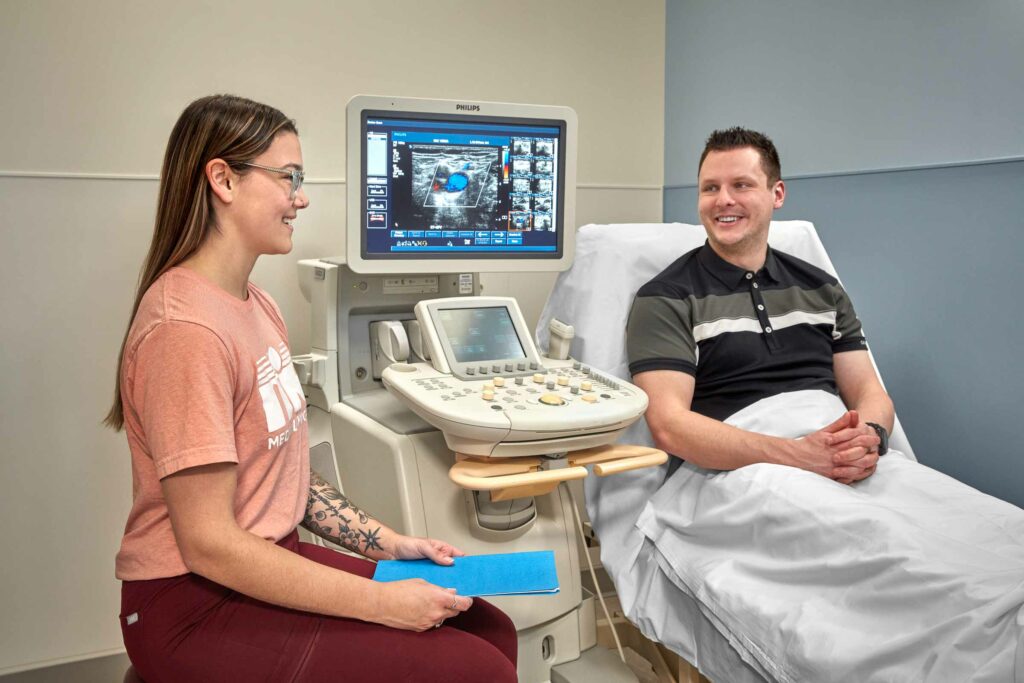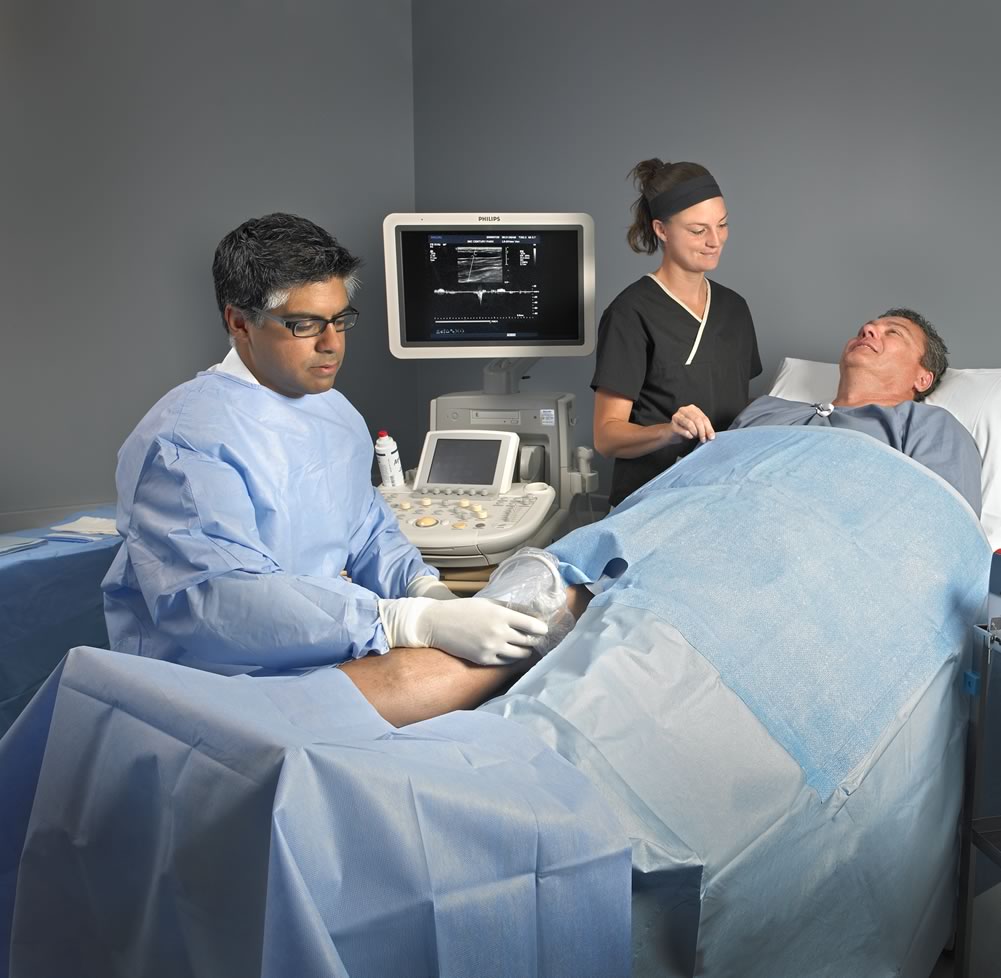Medically reviewed by Dr. Rohan Parab, M.D, FRCPC (Diagnostic Radiology), FRCPC (Interventional Radiology)
What are Varicose Veins?
Varicose veins are bulging, twisted veins visible beneath the skin. Varicose veins are a manifestation of an underlying venous condition known as chronic venous insufficiency (CVI) and are most often seen in the lower extremities (legs and ankles).
What Causes Varicose Veins?
Varicose veins are caused by venous hypertension, which is the result of prolonged venous insufficiency. Venous insufficiency occurs when vein walls or one-way valves weaken or fail.
Blood that typically flows through the valves from the body’s periphery to the heart now flows in both directions. This backwards flow of blood is known as venous reflux and can lead to pooling and accumulation of blood in the extremities.
Usually, the blood will pool in the lower extremities as it has a harder time fighting gravity on its way back to the heart. Pooling blood increases venous pressure, hypertension and further weakens veins – compounding in a downward spiral.
If left untreated, venous pressure and CVI can lead to additional symptoms such as swelling in the lower extremities and more varicose veins.
What Factors Lead to Valve Failure and Venous Reflux?
Four factors mainly impact valve damage and reflux:
- Heredity: family history is strongly associated with chronic venous insufficiency (CVI).
- Gender: estrogen and progesterone can weaken vein walls, leading to reflux and enlarged veins.
- Pregnancy: blood volume and hormone production increase during pregnancy, contributing to vein enlargement.
- Age: vein walls lose elasticity over time, increasing the likelihood of valve failure or reflux.
Additional factors correlated with CVI that can speed up vein disease:
- Prolonged standing: occupations or hobbies that require standing for an extended period can cause increased volume and pressure of the blood in the lower extremities due to gravity.
- Obesity: central obesity is strongly associated with intra-abdominal pressure from fat which may worsen vein problems.
- Hormone levels: treatment like birth control pills or postmenopausal hormone replacement may contribute to vein enlargement.
- Physical trauma: any damage to the lower extremities can also impact blood vessels and add to the problem.
Venous insufficiency is typically the result of hypertension. Occasionally, obstructions (blood clots) in the deep veins of the legs, known as deep vein thrombosis (DVT), can also lead to chronic venous insufficiency (CVI).
Research conducted by the Cleveland Clinic (2019) shows that as many as 30 percent of people with DVT will develop CVI within 10 years after their diagnosis.
Varicose Vein Assessment at MIC
The first step in assessing varicose veins is talking to your physician and obtaining a requisition to book an appointment with our team.
When you arrive at MIC for your assessment, our team will start with an ultrasound scan. We will examine the area of interest and your veins.
If we identify venous insufficiency, the next step is a consultation with one of our interventional radiologists.
During this consult, we will identify if any of our minimally invasive treatments are a viable option, and if so, which one is the best fit.
After an assessment with our radiologists, we may recommend a different course of action, such as vascular surgery through the hospital or a more conservative approach to manage your symptoms, such as compression stockings.
Varicose Vein Symptoms
Sometimes, patients might not experience any symptoms of varicose veins, or they may be very minor. Minor symptoms are usually cosmetic; veins appear twisted and bulging like cords on your legs.
However, depending on the patient, some might experience more serious or painful symptoms. More serious symptoms include:
- Sensations such as throbbing, burning, or achy feeling in the legs
- Swelling of the lower extremities
- Skin discolouration or a rash around the varicose veins
- Dry, thinned, itchy skin
- Pain or discomfort at the end of the day, after sitting or standing for long periods
- Skin tissue problems such as ulcers or sores on the legs
Patients with varicose veins may find some relief by elevating their feet after a long day. Patients must talk to their healthcare provider to obtain a proper diagnosis. Sometimes varicose vein symptoms may resemble other conditions and, on rare occasions, can lead to complications.
How to Prevent Varicose Veins
If you are looking to reduce your risk of developing varicose veins, you should focus on self-care and improving circulation in your legs. Self-care is particularly important during times of your life when you might experience hormonal fluctuations such as pregnancy.
The following steps can help reduce your risk to some extent:
- Use compression stockings to improve circulation
- Avoid long periods of standing or sitting
- Maintain a balanced diet – high in fibre and low in salt
- Exercise regularly (walks, biking, stairs etc.)
- Elevate your legs at the end of the day
- Quit smoking
Spider Veins
Spider veins are small clusters of red, blue, or purple superficial veins found just beneath the skin. The veins are often clustered in a weblike network and get their name from the discolouration pattern. Generally speaking, spider veins are harmless and only cause a cosmetic nuisance.
Spider Veins vs. Varicose Veins
While both conditions can cause discomfort and irritation, varicose veins are a medical condition resulting from chronic venous insufficiency (CVI). Spider veins are a cosmetic condition linked to many factors, including genetics and hormonal fluctuations. Varicose veins look like twisted ropes bulging above the skin, while spider veins look like delicate purple/blue clusters beneath the skin
Varicose Vein Surgery
If our radiologists recommend varicose vein surgery, our team will refer you to a hospital specialist to determine the next steps. The most common surgical treatment for venous insufficiency is vein stripping. However, surgery is only recommended in rare cases where lifestyle changes have failed and patients are in significant discomfort from their varicose veins.
Varicose Veins FAQ
Varicose veins may or may not be painful – depending on the patient. The most common pain symptoms are aching, throbbing, or sometimes burning sensations in your legs.
Varicose veins are a fairly common condition, occurring in 20-25% of the Canadian adult population (Dooner, 2011). As stated by the Canadian Society for Vascular Surgery, women are slightly more likely to develop varicose veins than men (60/40%).
Varicose veins are large, twisted veins in the leg with weakened valves. As blood flow is restricted in these veins, clots can form as a result of pooling blood. Usually, blood clots form in superficial veins near the skin's surface, but occasionally they can form in the leg's deep veins. Our team will work with your healthcare provider to assess your risk for clots and thrombosis.
Varicose veins are very strongly correlated to genetics. If either of your parents have poor vein structure, weak valves, thin walls, low muscle density, etc., there is a high chance you will inherit their inefficient valve composition. More specifically, if one of your parents has the condition, you have a 40% chance of inheriting varicose veins. If both of your parents have varicose veins, there is a 90% chance you will inherit them.
Most varicose veins are visible just beneath the skin. However, some varicose veins can occur deeper inside the leg muscle and other areas of the body which are not visible. These veins can only be confirmed through a venous ultrasound scan.
Varicose veins will not go away on their own. Symptoms may fluctuate depending on your lifestyle and changes in your physical activity, but they will likely return over time. Many forms of treatment like compression stockings can help manage symptoms but do not cure the underlying condition – venous insufficiency.
Varicose veins can burst because of weakened walls and high blood pressure. If the vein ruptures internally, it will pool, leading to bruising, dizziness, and even fainting. If the vein ruptures and breaks the skin, profuse bleeding can occur because of the excess pressure. If your varicose veins burst, it is essential to elevate your leg, apply pressure, and immediately seek medical attention.
Common varicose vein symptoms include throbbing, aching, burning, or swelling of the lower extremities, including the knee. Therefore, varicose veins or venous insufficiency can cause knee pain.
Yes, varicose veins can occur in almost any part of the body, depending on vein health. Typically, they appear in the lower extremities and often, symptoms will present in one leg before the other. Healthcare professionals are still divided as to why, but many believe it is because of damage to the vein or valve on that side of the body.
Losing weight will help improve circulation in your body and may reduce some of the symptoms related to varicose veins, but it will not make them disappear. However, losing weight does help prevent new varicose veins from forming, so it is a helpful treatment strategy.
Itching is a common symptom of varicose veins. Itchiness can be the result of a few situations, one of which is increased histamine in the body. Histamine is a hormone produced by the body to help heal damaged veins. Another situation is when blood pools in the soft tissue. When vein walls burst under pressure, blood leaks out into the soft tissue beneath the skin. The build-up of blood and associated inflammation reduce the amount of oxygen that can reach your skin leading to dermatitis. This venous stasis dermatitis can create very intense itching symptoms.
Canada Vein Clinics. (n.d.). Are varicose veins genetic? https://www.canadaveinclinics.ca/are-varicose-veins-genetic/
Canada Vein Clinics. (n.d.). How hormonal changes affect the veins. https://www.canadaveinclinics.ca/how-hormonal-changes-affect-the-veins/
Cleveland Clinic. (2019, May 14). Chronic Venous Insufficiency (CVI). https://my.clevelandclinic.org/health/diseases/16872-chronic-venous-insufficiency-cvi
Cleveland Clinic. (2018, Jun 4). Are your varicose veins a sign of deeper trouble. https://health.clevelandclinic.org/are-your-varicose-veins-a-sign-of-deeper-trouble/
Delaware Advanced Vein Center. (2020, Oct 12). Your varicose vein just burst: now what? https://delawareadvancedveincenter.com/blog/your-varicose-vein-just-burst-now-what/
Dooner, J. (2011). Varicose Veins. Canadian Society for Vascular Surgery. https://canadianvascular.ca/Varicose-Veins
Douketis, J. (2021). Varicose Veins. Merck Manual Professional Version. https://www.merckmanuals.com/en-ca/professional/cardiovascular-disorders/peripheral-venous-disorders/varicose-veins
Harvard Health Publishing Medical School. (2019, Jan 09). Spider Veins. https://www.health.harvard.edu/a_to_z/spider-veins-a-to-z
Healthline. (2017, Mar 30). Varicose Veins. https://www.healthline.com/health/varicose-veins#outlook
Johns Hopkins Medicine. (n.d.). Chronic Venous Insufficiency. https://www.hopkinsmedicine.org/health/conditions-and-diseases/chronic-venous-insufficiency
Johns Hopkins Medicine. (n.d.). Varicose Veins. https://www.hopkinsmedicine.org/health/conditions-and-diseases/varicose-veins
Mackay, E. (2019). Why varicose veins itch. Dr. MacKay. https://www.drmackay.com/varicose-veins-itch/
Mayo Clinic. (2021, Jan 30). Varicose Veins. https://www.mayoclinic.org/diseases-conditions/varicose-veins/symptoms-causes/syc-20350643
Medical News Today. (2017, Dec 8). What is sclerotherapy? https://www.medicalnewstoday.com/articles/320282
Morrison, N., Gibson, K., McEnroe, S., Goldman, M., King, T., Weiss, R., Cher, D., Jones, A. (2015). Randomized trial comparing cyanoacrylate embolization and radiofrequency ablation for incompetent great saphenous veins (VeClose). Journal of Vascular Surgery, 61(4), 985–994.
Morrison, N., Gibson, K., Vasquez, M., Weiss, R., Jones, A. (2020). Five-year extension study of patients from randomized trial comparing cyanoacrylate embolization and radiofrequency ablation for incompetent great saphenous veins (VeClose). Journal of Vascular Surgery, 8(6), 978–989.
My Health Alberta. (2020, Mar 4). Varicose Veins. https://myhealth.alberta.ca/Health/pages/conditions.aspx?hwid=hw113838
National Heart, Lung, and Blood Institute. (n.d.). Varicose Veins. https://www.nhlbi.nih.gov/health-topics/varicose-veins
Pittsburgh Vein Doc. (2018, Jun 25). The difference between chronic venous insufficiency and varicose veins. https://pittsburghveindoc.com/chronic-venous-insufficiency-varicose/
Prime Heart and Vascular. (n.d). Learning the difference between chronic venous insufficiency and obstruction. https://www.primehv.com/blog/learning-the-difference-between-chronic-venous-insufficiency-and-obstruction
Proebstle, T., Alm, B., Göckeritz. O., Wenzel, C., Noppeney, T., Lebard, C., Sessa, C., Creton, D., Pichot, O. (2015). Five-year results from the prospective European multicentre cohort study on radiofrequency segmental thermal ablation for incompetent great saphenous veins. BJS (British Journal of Surgery), 102(3), 212–218.
Proebstle, T., Alm, J., Dimitri, S., Rasmussen, L., Whiteley, M., Lawson, J., Davies, A. (2021). Three-year follow-up results of the prospective European Multicenter Cohort Study on Cyanoacrylate Embolization for treatment of refluxing great saphenous veins. Journal of Vascular Surgery: Venous and Lymphatic Disorders, 9(2), 329–334.
Sudheendra, D. (2020, Jun 16). Varicose Vein Stripping. Mount Sinai. https://www.mountsinai.org/health-library/surgery/varicose-vein-stripping
University of California San Francisco Department of Surgery. (n.d.). Chronic Venous Insufficiency. https://surgery.ucsf.edu/conditions--procedures/chronic-venous-insufficiency.aspx


